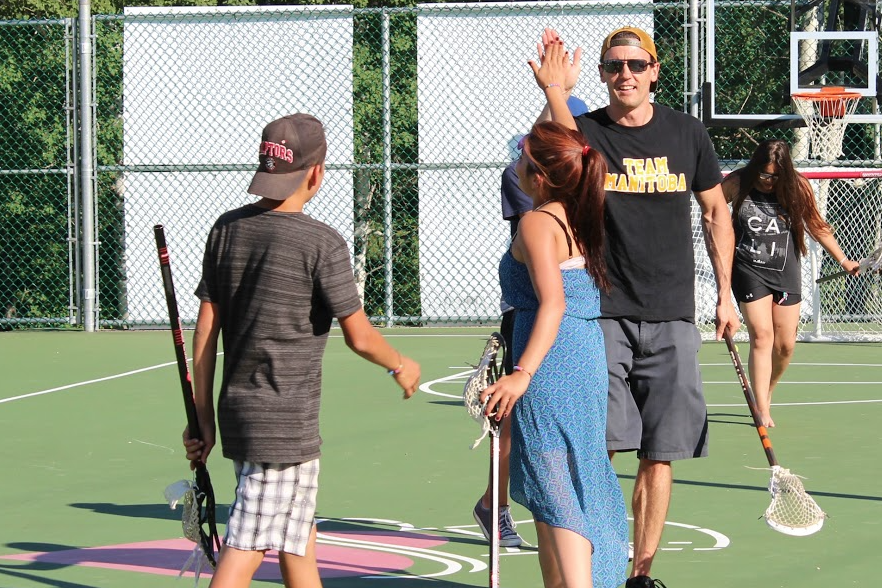
Don Jacks (second right) offers up a high five to one of the Youth1st participants at Camp Brereton.
U of M alumnus building community through lacrosse
Upon graduating from the University of Manitoba, Don Jacks [B.F.A., Hons/06] worked as a student recruiter for two years, but his passion has always been playing lacrosse. Now, he’s recruiting young Indigenous athletes to the sport through Youth1st Lacrosse.
Jacks has been playing lacrosse for 25 years, representing Canada on the national level on numerous occasions. He also served as the executive director for the Manitoba Lacrosse Association from 2010 to 2016.
During his time with the association, Jacks began working with the Dakota Ojibway Police Service, delivering lacrosse workshops for six different Indigenous communities.
While offering these lessons, he saw a need for better-designed recreational programming in Manitoba’s Indigenous communities.
“[The Dakota Ojibway Police Service] has a cadet program and they run recreational activities, and I started working with them that way,” Jacks says. “I started making a lot of contacts through the communities, and I got to the point where I said, OK, I can go out there and just start teaching lacrosse on my own.”
Through his demonstrations, Jacks has been able to use the creativity he fostered while obtaining his Bachelor of Fine Arts degree.
“There’s definitely something about creativity and putting [these workshops] all together,” he says. “I’ve been noticing a correlation between trusting my instincts and just kind of going with the flow and the process and seeing where it goes.”
For Jacks, lacrosse is more than just a sport.
“I think lacrosse is such a strong tool. It’s much more than a game. It’s the medicine game and it’s the Creator’s game,” he says.
“It was believed that [lacrosse] was a gift from the Creator given to the people, so we play for the Creator. Also known as the medicine game, it’s believed that it can heal those who are sick in the community, whether it’s spectators coming to cheer on players or the players themselves.”
The University of Manitoba’s goals align with Jacks’ lessons.
‘Creating Pathways to Indigenous Achievement’ is a priority in Taking Our Place: University of Manitoba Strategic Plan: 2015-2020. Under that priority is a goal to ‘foster a greater understanding of Indigenous knowledge, cultures and traditions among students, faculty and staff.’
“Lacrosse was not a game; it was a spiritual ceremony that brought community together. That was the purpose of it and I think it still is about that, and sport in general,” says Dr. Lynn Lavallée, Vice-Provost (Indigenous Engagement) at the U of M.
“If you look at the North American Indigenous Games, youth from all over come together and celebrate. It’s kind of like our Pow Wow. I think having that within the institution and the office of Indigenous Engagement, that’s what we’re about. We’re about reaching out and coming together.”
Jacks always starts his workshops by teaching the history of lacrosse, as well as the basic fundamentals of the sport.
“I’ll ask the youth, ‘Do you know who invented this game and where the origins started from?’ and nobody knows about it. They’re always surprised that it is an Indigenous game, and once they understand the five basic principles of the sport, they’re up and running,” he says.
Recently, Jacks hosted the inaugural Canada Day LAX Bash at The Forks. More than 200 Indigenous youth from across Manitoba took part. The day concluded with the first-ever game between the First Nations communities of Roseau River and Long Plain, both of whom are actively involved in Youth1st programming.
Jacks’ long-term vision for Youth1st is to create a facility dedicated specifically to lacrosse.
“There’s not too many places to play lacrosse, so that’s our hope long-term, that we can be able to provide lacrosse opportunities throughout the year,” he says. “The biggest thing is to understand what our vision is, which is to build lacrosse in Manitoba, as well as see it flourish in the Indigenous communities.”






